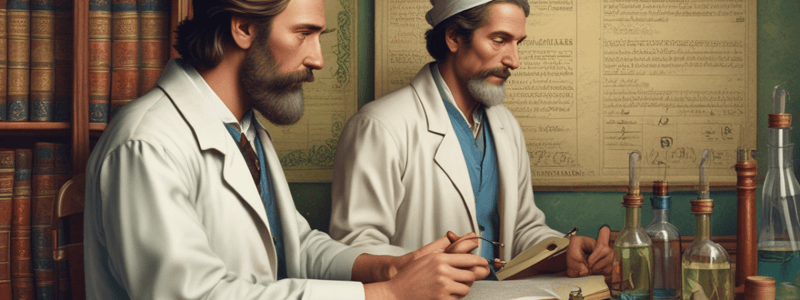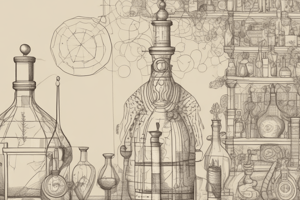Podcast
Questions and Answers
Who contradicted Galen's teachings about blood regeneration?
Who contradicted Galen's teachings about blood regeneration?
- Vesalius
- Paracelsus
- Edward Jenner
- The author of On the Motion of the Heart (correct)
What was the significance of Edward Jenner's discovery?
What was the significance of Edward Jenner's discovery?
- Discovery of the circulatory system
- Identification of the composition of substances
- Discovery of the germ theory
- Development of vaccination as a way to prevent disease (correct)
What was the achievement of Paracelsus and Vesalius in the 16th and 17th centuries?
What was the achievement of Paracelsus and Vesalius in the 16th and 17th centuries?
- Discovery of vaccination
- Laying the foundation for modern understanding of the human body and composition of substances (correct)
- Development of the germ theory
- Contradiction of Galen's teachings
What was the significance of the author's discovery in On the Motion of the Heart?
What was the significance of the author's discovery in On the Motion of the Heart?
What was the outcome of the work of early physicians and chemists?
What was the outcome of the work of early physicians and chemists?
Flashcards are hidden until you start studying
Study Notes
Medicine Before the Scientific Revolution
- Medicine was largely based on Galen's teachings, which emphasized the importance of balancing the four humors and temperaments of the body.
- Galen's techniques were based on observation and experimentation, but his theories were widely accepted as fact without being tested.
- Primitive and detrimental procedures, such as bloodletting, were developed based on Galen's theories.
- Bloodletting, which involved draining moderate quantities of blood from the patient, was believed to cure illnesses caused by excess blood in the body.
Chemistry Before the Scientific Revolution
- Chemistry was prone to inaccuracies due to basic misunderstandings of nature and the elements.
- Most people believed in the Aristotelian model of the world, which stated that all substances were composed of combinations of four basic elements: fire, air, water, and earth.
- Alchemy, which aimed to turn baser metals into gold or silver, was a prevalent practice.
New Ideas: Paracelsus
- Paracelsus, a Swiss-born chemist, rejected common practices like bloodletting and Galen's theories.
- He favored experimentation as the key to understanding the world and claimed diseases were caused by 'bad seeds'.
- Paracelsus publicly burned copies of Galen's work.
New Ideas: Andreas Vesalius
- Andreas Vesalius, a Flemish contemporary of Paracelsus, made important discoveries about the human body through dissections.
- He correctly identified that the human heart had four chambers, contradicting Galen's claim that it had only two.
- Vesalius created the world's first medical textbook, De Humani Corporis Fabrica, which included detailed illustrations of the human body.
New Ideas: Iatrochemists
- Iatrochemists focused on preparing substances and solutions in the purest way possible.
- They made extensive qualitative and quantitative notes on their mixtures and experiments to ensure consistency.
- Jean Beguin's 1610 work, Tyrocinium Chymicum, is considered one of the first modern chemistry textbooks.
New Ideas: Robert Boyle
- Robert Boyle, an Irish-born chemist, was an accomplished empiricist who believed only in what he had learned from experimentation.
- He is famous for discovering Boyle's Law, which states that the volume of a gas varies inversely with pressure.
New Ideas: William Harvey
- William Harvey, an English physician, discovered that blood was continuously pumped throughout the body by the heart and that the body contained a fixed amount of blood.
- His discovery contradicted Galen's teachings, which claimed that blood was continuously being regenerated by the heart.
Medicine and Chemistry Moving Forward
- The work of Paracelsus, Vesalius, and others laid the foundation for our modern understanding of the human body and the composition of substances.
- Achievements such as Edward Jenner's discovery of vaccination and the discovery of germ theory were largely based on the empiricism pioneered by these early physicians and chemists.
Studying That Suits You
Use AI to generate personalized quizzes and flashcards to suit your learning preferences.




